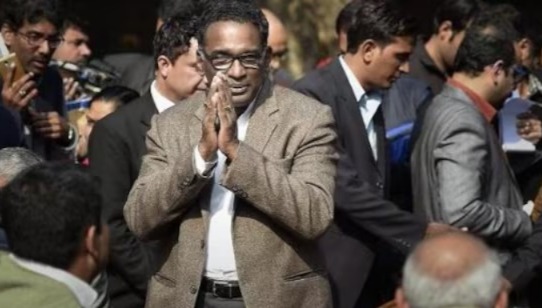Chennai: Former Supreme Court judge Justice Jasti Chelameswar asserted that the apex court has the constitutional authority to issue directions to the President of India, similar to its power to review laws enacted by Parliament.
Delivering the Rakesh Endowment Lecture on the theme ‘The 75th Year of the Constitution’ on Saturday, Justice Chelameswar defended the Supreme Court’s recent directive requiring the President and governors to grant assent to state legislation within a stipulated time frame. He emphasised that the judiciary’s role in reviewing laws extends to issuing binding instructions to constitutional authorities.
“We have accepted that the judiciary can determine whether a law is constitutional. To say that it cannot direct a constitutional office-holder like the President to act would be constitutionally doubtful,” he remarked, in response to a question from former Madras High Court judge Justice C.T. Selvam. The question had referenced recent comments by Vice President Jagdeep Dhankhar, who questioned the Court’s authority to issue such directives.
Justice Chelameswar noted that much of the controversy could have been avoided had the Supreme Court directed the Union Government to offer appropriate advice to the President regarding assent to bills. “The President acts on the aid and advice of the Union Cabinet. Had the Court directed the Union Government to advise the President within three months, there would have been no objection,” he said.
On the issue of conflicting Central and State laws, the former judge elaborated on Article 254 of the Constitution, noting that a state law can prevail if it receives presidential assent. “If the President refuses assent, what recourse does one have?” he questioned, highlighting the critical role of the President’s discretion in maintaining federal balance.
Responding to another query by Justice G.R. Swaminathan of the Madras High Court regarding the current direction of India’s constitutional journey, Justice Chelameswar observed, “It is a long march. There is no overnight solution.”
The lecture was held in Chennai and was organised by the Rakesh Endowment Foundation in association with the Roja Muthiah Research Library, marking the birth anniversary of Rakesh Ranganathan, late son of senior advocate and DMK Rajya Sabha MP, N.R. Elango.
Let the Truth be known. If you read VB and like VB, please be a VB Supporter and Help us deliver the Truth to one and all.
Kolkata(PTI): Leader of Opposition in West Bengal assembly, Suvendu Adhikari, on Saturday wrote to Governor C V Ananda Bose, seeking an independent judicial inquiry into “administrative incompetence” and “public humiliation of citizens”at the Salt Lake Stadium here during an event featuring football legend Lionel Messi.
In his letter, Adhikari alleged that the stadium, built with public funds, was converted into a “private durbar” for political elites, resulting in humiliation and harassment of spectators who had purchased tickets.
"I write this communication with a profound sense of anguish, constitutional alarm, and moral urgency. What unfolded at the Yuva Bharati Krirangan was not merely an episode of administrative incompetence, it was a public humiliation of citizens, a grotesque exhibition of unrestrained political privilege, and a direct assault on the rule of law in the presence of thousands of witnesses," Adhikari asserted.
He claimed that football fans were denied basic amenities and dignified viewing due to unchecked VIP presence, obstruction of sightlines, and arbitrary restrictions.
Chaos unfolded at the Salt Lake Stadium on Saturday, after spectators resorted to vandalism on failing to catch a glimpse of Messi, alleging gross mismanagement by the organisers and obstruction of views by VIPs.
Police arrested the event’s prime organiser, Satadru Datta, while Chief Minister Mamata Banerjee announced the constitution of a high-level inquiry committee to probe the incident.
Adhikari, in his letter, held the sports department, police authorities and the minister-in-charge of sports and youth affairs responsible, alleging that the situation was “enabled, if not orchestrated”, by the state administration.
He claimed that the conduct of the authorities reflected indifference to public accountability and misuse of power.
The senior BJP leader also took exception to the inquiry committee announced by the chief minister, contending that it lacked independence and credibility.
Adhikari said the panel is headed by Justice (Retd) Asim Ray, who currently holds a statutory post under the administrative control of the state government, and includes senior bureaucrats whose actions are under scrutiny.
"This committee is structurally compromised, legally infirm, and morally indefensible," he said in the letter to the governor.
Adhikari urged Bose to exercise his constitutional authority to order the formation of a truly independent inquiry committee.
He proposed that the committee be headed by a sitting judge of the Calcutta High Court, and assisted by persons of unimpeachable integrity with no institutional, administrative or political affiliation with the state government.
“The issue transcends football, politics, and personalities. It concerns the right of citizens to be treated with dignity, the obligation of the state to act as trustee of public interest, and the duty of constitutional authorities to intervene when the executive becomes a law unto itself,” Adhikari said.
Later, speaking to reporters, he accused the state government of mismanaging the situation at Salt Lake Stadium, and demanded the resignation of the CM.
Adhikari said all those responsible for the fiasco should be arrested, and spectators must be provided refunds.
He alleged that senior Trinamool Congress leaders and their associates crowded around Messi, leaving thousands of fans at the stadium deprived of catching a clear glimpse of the football star.
“This was a case of misuse of power at the cost of ordinary citizens. The chief minister must take moral responsibility, those responsible for the incident should be arrested, and every fan who was cheated must get a refund,” Adhikari asserted.
He added that public anger would not subside without accountability and corrective action.





